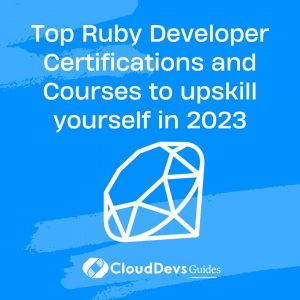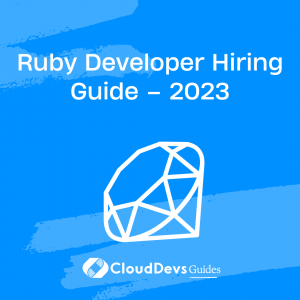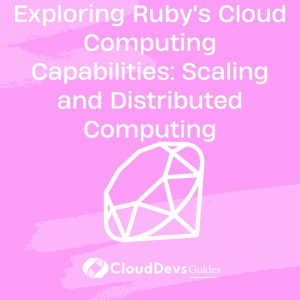Top Ruby Developer Certifications and Courses to upskill yourself in 2023
Table of Contents
Table of Contents
1. Professional Ruby on Rails Developer with Rails 5 by Udemy
This course will guide you through various aspects of Ruby on Rails, including installation, configuration, MVC architecture, models, views, controllers, testing, Ruby, object-oriented programming, ActiveRecord, and advanced topics. By the end of the course, you will have the confidence to build robust and scalable applications using Ruby on Rails.
- Overview of Ruby on Rails and models: In these sections, you will get a thorough understanding of Ruby on Rails and its various components. You will explore how to create models to represent your data, how to work with databases using ActiveRecord, and how to interact with models using Ruby on Rails APIs.
- Views: In this section, you will explore views in Ruby on Rails, understand how to create dynamic web pages, and how to render data from the controller to the view
- Web application development: Through this section, you will learn how to develop web applications using the Ruby on Rails framework. This section covers topics such as routing, controllers, views, models, and RESTful APIs. You also explore techniques for handling database interactions, user authentication, and application security.
- Testing and debugging: The course covers testing in Ruby on Rails, an essential skill for any serious developer. You will learn how to test your application effectively, identify bugs early, and ensure the quality of your code.
- The final project: This section provides an opportunity for you to demonstrate your skills and showcase their proficiency in Ruby programming. The project involves building a full-fledged application, following industry best practices and applying concepts learned throughout the program. This project will serve as a testament to your proficiency in Ruby on Rails and help you showcase your skills to potential employers or clients.
Included in this course are 19.5 hours of on-demand video. By enrolling in this course, you will gain a solid foundation in Ruby on Rails, learn how to build real-world applications, and acquire valuable skills that will boost your career in web development.
2. The Complete Ruby on Rails Developer Course by Udemy
This comprehensive online course is designed to provide a solid foundation in Ruby on Rails development. Taught by industry experts, it covers everything from basic Ruby concepts to building complex web applications using Rails. Through hands-on exercises and projects, learners gain practical experience and develop real-world skills.
- Introduction to Ruby on Rails: In this part of the course, you will be introduced to the fundamentals of Ruby on Rails, including the differences between Ruby on Rails and other frameworks, such as PHP and ASP.NET.
- Ruby on Rails Basics: In this section, you will learn how to set up a development environment and create their first Ruby on Rails application. They will also gain an understanding of MVC architecture, an essential concept in Ruby on Rails development.
- Ruby on Rails Models: In this section, you will learn how to create and validate models, as well as access and manipulate the data stored in them. This section also covers database migrations and database schema design, ensuring that you can create robust and scalable applications.
- Ruby on Rails Views: In this section, you will explore the fundamentals of views, including the organization of views, rendering templates, and using helper methods.
- Ruby on Rails Controllers: Controllers are the intermediary layer between models and views. They receive user requests, process them, and take action based on the request. In this section, you will understand the purpose and organization of controllers, as well as how to create, test, and handle requests.
- Ruby on Rails Routing: In this section, you will gain an understanding of routes, including how they are configured, how they are linked to controllers and actions, and how to redirect requests.
- Ruby on Rails Testing: Ruby on Rails provides powerful testing features. In this section, you will learn various testing techniques, such as unit testing, integration testing, and end-to-end testing. They will also learn how to write effective tests that are fast, reliable, and easy to maintain.
- Ruby on Rails Deployment: This section covers the process of deploying a Ruby on Rails application to a production environment.
This course includes 45.5 hours on-demand video. By completing this course, you will therefore have a strong foundation in Ruby on Rails and will be well-prepared to build robust, scalable web applications.
3. Ruby on Rails 6: Complete Beginner’s Course by Udemy
This course, offered by Udemy, focuses specifically on Ruby on Rails version 6. It covers topics such as MVC architecture, database integration, authentication, and deployment. With step-by-step guidance, learners gain the necessary skills to build and deploy web applications using Rails.
-
- Ruby on Rails Basics: In this section, the course seeks to cover the fundamentals of Ruby on Rails, including an overview of the framework, Ruby basics, HTML basics, and CSS basics.
- Controllers: Controllers are the backbone of Rails applications. They handle the requests and responses between the database and the view layer. In this section, developers delve into the world of controllers, including an introduction to their actions and rendering and redirecting.
- Models: Models in Rails are responsible for interacting with database entities and managing the persisted data. In this section, the course explores the fundamentals of models, including data validation, creating and updating records, and associations.
- Views: Views are the presentation layer of a Rails application. They generate the HTML output that the users see in the browser. In this section, views are extensively studied, including templating and JavaScript integration.
- Ruby on Rails 6 Testing: Testing is a crucial aspect of software development, and Ruby on Rails provides a robust test framework. In this section, the course covers the basics of testing in Rails, including testing of controllers, models, and views.
This course involves 4.5 hours on-demand video. By following the content covered in the Ruby on Rails 6: Complete Beginner’s Course, developers will be equipped with the essential knowledge and skills to develop robust and maintainable web applications using the Ruby on Rails framework.
4. The Ruby Testing Course with RSpec by Udemy
Testing is a crucial aspect of software development, and this course focuses on teaching Ruby developers how to write effective tests. It covers topics such as test-driven development (TDD), behavior-driven development (BDD), and using testing frameworks like RSpec. By mastering testing techniques, developers can ensure the quality and reliability of their Ruby applications. The Ruby Testing Course is designed specifically for Ruby developers looking to gain a solid understanding of testing concepts and best practices.
- Unit Testing: In the Ruby Testing Course, you gain a comprehensive understanding of unit testing concepts and techniques. You learn about the different types of unit tests, such as acceptance tests, unit tests, and mocking tests. You also learn to write effective unit tests, covering both white box and black box testing approaches.
- Integration Testing: In this section you learn about the different types of integration tests, such as system tests, component tests, and user interface tests. You also learn to write effective integration tests, ensuring that the various components of an application work together seamlessly.
- End-to-end Testing: In this section, you learn about the different types of end-to-end tests, such as functional tests and usability tests. You also learn to write effective end-to-end tests, simulating user actions and verifying the expected outcomes.
- Mocking: In this section, learners learn about the different types of mocks, such as mock classes, mock objects, and stubbing. You also learn to write effective mocks, effectively decoupling dependencies and simplifying testing.
While the Ruby Testing Course provides 7.5 hours on-demand video, the course aims to provide developers with a strong understanding of testing concepts and best practices, by learning these concepts and implementing them in practice, Ruby developers can write robust and high-quality applications.
5. Ruby Metaprogramming: The Complete Course by Udemy
Metaprogramming is a powerful technique in Ruby that allows developers to write code that can modify itself at runtime. This course explores the concepts and techniques of metaprogramming in Ruby, enabling developers to create dynamic and flexible applications. It covers topics such as method_missing, define_method, and class_eval, providing a comprehensive understanding of metaprogramming principles.
- Introduction to Ruby Metaprogramming: In this section, you will gain an understanding of the basics concepts of metaprogramming. They will learn about the concepts behind metaprogramming, including its purpose and how it works in Ruby.
- Metaprogramming techniques: This section of the course focuses on different metaprogramming techniques that can be used to enhance program functionality. In this section, you will explore the power of reflection and how it can be used to access and modify objects. Additionally, you will learn about the use of macros in metaprogramming.
- Practical Metaprogramming: This section delves into the real-world applications of metaprogramming. In this section, you will learn how to solve complex problems using metaprogramming techniques.
- Optimization techniques: This section of the course covers optimization techniques that can be applied using metaprogramming. You will explore how metaprogramming can be used to improve the performance of their applications.
- Performance of metaprogrammed code: Finally, this section covers analyzing the performance of metaprogrammed code. You will explore tools and techniques for measuring the impact of metaprogramming on application performance.
This course involves 4.5 hours on-demand video. Therefore, with this course, you will gain a solid understanding of metaprogramming concepts and techniques, enabling them to solve real-world problems effectively.
6. Ruby On Rails for Web Development by Udemy
By pursuing this course, you will learn how to build robust and scalable web applications using the Ruby on Rails framework. Whether you are a complete beginner or an experienced developer looking to learn Ruby on Rails, this course will guide you through the fundamentals of Ruby on Rails and teach you how to build real-world applications.
- Authentication: Implementing authentication in a Ruby on Rails application is an essential skill for any web developer. In this section, you will learn how to handle user authentication using the built-in authentication libraries in Ruby on Rails. We will cover topics such as creating user models, storing passwords securely, and integrating with a database to implement authentication.
- REST APIs: Building RESTful APIs is a critical skill for modern web developers. In this section, you will learn about the principles and practices of building RESTful APIs with Ruby on Rails. We will cover topics such as creating resource-oriented URLs, designing API endpoints, and using HTTP verbs and responses.
- Integration with External Services: In today’s connected world, it’s common for web applications to integrate with external services. In this section, you will learn how to integrate your Ruby on Rails applications with popular third-party services such as databases, payment gateways, and social media platforms. We will cover topics such as working with database migrations, implementing OAuth authentication, and integrating with REST APIs.
- Deployment: In this section, you will learn about different deployment strategies for Ruby on Rails applications. We will cover topics such as setting up continuous integration pipelines, deploying to production servers, and managing database migrations.
Included in this course are 6 hours of on-demand video. By the end of this course, you will be capable of building robust and scalable web applications using the Ruby on Rails framework.
| Course/ program | Cost | Level | Duration | Study mode |
|---|---|---|---|---|
| Professional Ruby on Rails Developer with Rails 5 | $19.99 | Beginner | 19.5 hours | Online |
| The Complete Ruby on Rails Developer Course by Udemy | $74.99 | Beginner | 45.5 hours | Online |
| Ruby on Rails 6: Complete Beginner's Course | $64.99 | Beginner | 4.5 hours | Online |
| The Ruby Testing Course with RSpec by Udemy | $74.99 | Intermediate/ Advanced | 7.5 hours | Online |
| Ruby Metaprogramming: The Complete Course by Udemy | $49.99 | Intermediate/ Advanced | 4.5 hours | Online |
| Ruby On Rails for Web Development | $19.99 | Beginner | 6 hours | Online |
While levels, costs and duration of each of the courses vary, some tend to be more expensive, and some are more appropriate for beginners while others for intermediate or advanced developers. For your choice of which Ruby Developer Certifications and Courses to pursue, it remains key to consider your own budget, skill level as well as goals.
7.0 Conclusion
These certifications and courses provide valuable opportunities for Ruby developers to enhance their skills and stay up-to-date with the latest trends and best practices in Ruby development. Whether you are a beginner or an experienced developer, investing in these resources can significantly boost your proficiency and open doors to exciting career opportunities in 2023.


